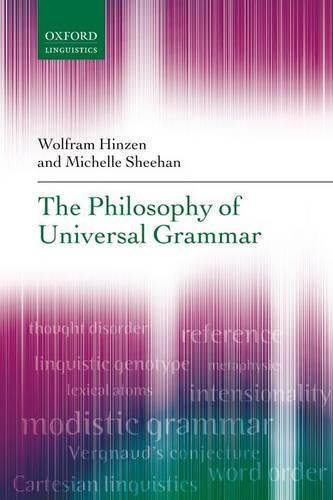Readings Newsletter
Become a Readings Member to make your shopping experience even easier.
Sign in or sign up for free!
You’re not far away from qualifying for FREE standard shipping within Australia
You’ve qualified for FREE standard shipping within Australia
The cart is loading…






What is grammar? Why does it exist? What difference, if any, does it make to the organization of meaning? This book seeks to give principled answers to these questions. Its topic is ‘universal’ grammar, in the sense that grammar is universal to human populations. But while modern generative grammar stands in the tradition of ‘Cartesian linguistics’ as emerging in the 17th century, this book re-addresses the question of the grammatical in a broader historical frame, taking inspiration from Modistic and Ancient Indian philosopher-linguists to formulate a different and ‘Un-Cartesian’ programme in linguistic theory. Its core claim is that the organization of the grammar is not distinct from the organization of human thought. This sapiens-specific mode of thought is uniquely propositional: grammar, therefore, organizes propositional forms of reference and makes knowledge possible. Such a claim has explanatory power as well: the grammaticalization of the hominin brain is critical to the emergence of our mind and our speciation. A thoroughly interdisciplinary endeavour, the book seeks to systematically integrate the philosophy of language and linguistic theory. It casts a fresh look at core issues that any philosophy of (universal) grammar will need to address, such as the distinction between lexical and grammatical meaning, the significance of part of speech distinctions, the grammar of reference and deixis, the relation between language and reality, and the dimensions of cross-linguistic and bio-linguistic variation.
$9.00 standard shipping within Australia
FREE standard shipping within Australia for orders over $100.00
Express & International shipping calculated at checkout
What is grammar? Why does it exist? What difference, if any, does it make to the organization of meaning? This book seeks to give principled answers to these questions. Its topic is ‘universal’ grammar, in the sense that grammar is universal to human populations. But while modern generative grammar stands in the tradition of ‘Cartesian linguistics’ as emerging in the 17th century, this book re-addresses the question of the grammatical in a broader historical frame, taking inspiration from Modistic and Ancient Indian philosopher-linguists to formulate a different and ‘Un-Cartesian’ programme in linguistic theory. Its core claim is that the organization of the grammar is not distinct from the organization of human thought. This sapiens-specific mode of thought is uniquely propositional: grammar, therefore, organizes propositional forms of reference and makes knowledge possible. Such a claim has explanatory power as well: the grammaticalization of the hominin brain is critical to the emergence of our mind and our speciation. A thoroughly interdisciplinary endeavour, the book seeks to systematically integrate the philosophy of language and linguistic theory. It casts a fresh look at core issues that any philosophy of (universal) grammar will need to address, such as the distinction between lexical and grammatical meaning, the significance of part of speech distinctions, the grammar of reference and deixis, the relation between language and reality, and the dimensions of cross-linguistic and bio-linguistic variation.